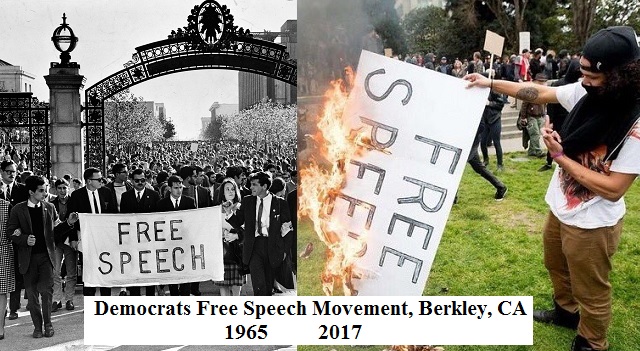
http://www.fsm-a.org/FSM_Participants.html
Berkley 1965 Free Speech march sponsored by supporters of Communist China.
https://en.wikipedia.org/wiki/Bob_Avakian http://archive.is/bWk3W
http://www.fsm-a.org/stacks/avakian.html http://archive.is/SAQQ1
Bob Avakian is the Chairman of the Central Committee of the Revolutionary Communist Party, USA. In 1964, as a student at UC Berkeley, he was active in the FSM and was arrested during the Sproul Hall sit-in. In 1981 Avakian was forced into exile in France because of his revolutionary activities. There he demanded, but was denied, status as a political refugee. He continues to lead the RCP from exile today. Avakian's nine books and numerous articles are available at Revolution Books, located in Berkeley (510-848-1196) and other major U.S. cities.
https://searchvoat.co/v/whatever/1933745 2017 Media Inspired Terrorism
https://medium.com/dose/my-wife-grew-up ... 85c25cb28b

https://archive.ph/CZpYi 2017 Voice of the Revolutionary Communist Party, USA
https://en.wikipedia.org/wiki/Freedom_of_speech Freedom of speech[2] is a principle that supports the freedom of an individual or a community to articulate their opinions and ideas without fear of retaliation, censorship, or legal sanction. The right to freedom of expression has been recognised as a human right in the Universal Declaration of Human Rights and international human rights law by the United Nations. Many countries have constitutional law that protects free speech. Terms like free speech, freedom of speech, and freedom of expression are used interchangeably in political discourse. However, in a legal sense, the freedom of expression includes any activity of seeking, receiving, and imparting information or ideas, regardless of the medium used.
Article 19 of the UDHR states that "everyone shall have the right to hold opinions without interference" and "everyone shall have the right to freedom of expression; this right shall include freedom to seek, receive, and impart information and ideas of all kinds, regardless of frontiers, either orally, in writing or in print, in the form of art, or through any other media of his choice". The version of Article 19 in the ICCPR later amends this by stating that the exercise of these rights carries "special duties and responsibilities" and may "therefore be subject to certain restrictions" when necessary "[f]or respect of the rights or reputation of others" or "[f]or the protection of national security or of public order (order public), or of public health or morals".[3]
Freedom of speech and expression, therefore, may not be recognized as being absolute, and common limitations or boundaries to freedom of speech relate to libel, slander, obscenity, pornography, sedition, incitement, fighting words, hate speech, classified information, copyright violation, trade secrets, food labeling, non-disclosure agreements, the right to privacy, dignity, the right to be forgotten, public security, and perjury. Justifications for such include the harm principle, proposed by John Stuart Mill in On Liberty, which suggests that "the only purpose for which power can be rightfully exercised over any member of a civilized community, against his will, is to prevent harm to others".[4]
The idea of the "offense principle" is also used to justify speech limitations, describing the restriction on forms of expression deemed offensive to society, considering factors such as extent, duration, motives of the speaker, and ease with which it could be avoided.[4] With the evolution of the digital age, application of freedom of speech becomes more controversial as new means of communication and restrictions arise, for example, the Golden Shield Project, an initiative by Chinese government's Ministry of Public Security that filters potentially unfavourable data from foreign countries. https://en.wikipedia.org/wiki/Freedom_of_speech

